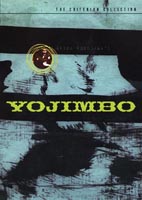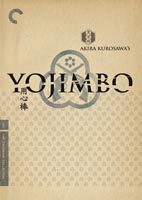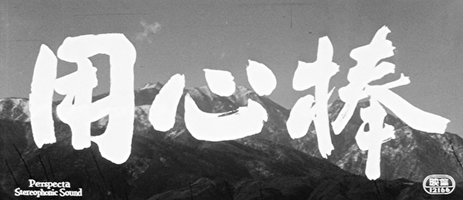1999:  2007:
2007: 

directed by Akira Kurosawa
screenplay by Ryuzo Kikushima and Akira Kurosawa
On we go. Criterion #52. Here too begins my new healthier attitude.
用心棒 = Yōjinbō = The Bodyguard, which is a perfectly good English title. Yojimbo is not.
I don’t know who’s going around saying that I love samurai movies but it’s not true. I’ve said it before, but I guess Akira didn’t hear me, so I say it again: I just don’t get much out of this genre. I find the milieu almost completely unexciting. The instant I see a wet noir street, or a glowing sci-fi planet, or a crumbling Dracula’s castle, I get a good eager taste in my mouth. When I see topknots and kimonos and dust and sliding panel doors I taste nothing. Like a big old gulp of air. Who cares.
This one I basically liked. So that means this one’s pretty great, all things considered. But it’s a drag to have to consider all things. I mean, when have all things ever considered me?
This one’s pretty great but I still don’t like samurai movies. I wrote a longer more intellectual(-sounding) entry investigating the ins and outs of why, but it was beating around the bush. The bush is a black-and-white mulberry bush somewhere on a studio lot in Japan. And who really wants to watch a bush?
Isn’t it important that we leave room in our worldview for there to be things that are genuinely boring? And once that room is made, are not samurai movies clearly such things?
Remember how George H.W. Bush didn’t like broccoli?
Beth said she finds samurai movies pleasantly lulling. I guess I can manage to find most things from before around 1970 pleasantly lulling, in a pinch. Maybe this project qualifies as a pinch.
Kurosawa continues to strike me as being too stately to be punchy and too punchy to be stately. Dammit, how fast is my heart supposed to be beating? Maybe what’s going in is that I’m too uncentered a person to savor balance, but to me it doesn’t feel like balance; it feels like taste tug-o-war between a fish and a fowl.
The exposition in this movie seems to me completely fumbled, undramatic and confusing, and then the story structure is designed around longueurs and redundancies that let the air out. Toward the end, undeniably, there’s some really good pulpy stuff — a top-notch escape from a locked room, for example. But then why wasn’t it all like that? Why is so much of it like hammy theater? Who’s this for? Why don’t I know how to be, watching it?
I think the answer is: dignity, boredom, innocence, and fun are different cultural quantities in Japan, so the math works out differently. Witness karaoke.
But only slightly differently. Every aspect of this movie that worked for me also seemed very American. Call me a jerk if you will, but I think present-day film buffs tend to love Kurosawa because it’s the least adventurous way to like something foreign. It’s just Hollywood as done by a stodgy Japanese uncle. Focusing the mind to be able to disregard the stodge and see through to the intention seems to be a gratifying part of some people’s intellectual self-image. How else to explain these commentary tracks (this one being no exception), which worshipfully point out every composition and editorial choice, even when those choices are blatantly gawky and ineffective? It reminds me of the analyses of 12-tone music I had to read in college: y’all sure have lots to say about what makes it so great but you skipped the part where we investigated whether it is so great.
My response to this commentary track, as to many other commentary tracks (as to many other things I encountered in college besides 12-tone theory): 1) Analysis is not in itself worthwhile or significant, nor does it demonstrate that the thing analyzed is worthwhile or significant. Anything can be analyzed. 2) Mere description is not analysis.
I mean, the commentary is fine. It’s conscientious and scholar-dull as you’d imagine, and tries to make a sweeping historical reading, which is silly. The included documentary from Japanese TV is much like the one on High and Low. It’s good enough but the overarching Japanese low self-esteem makes it all strangely small. They manage to make ostensible pride seem pathetic. What’s the opposite of a humblebrag? Anyway, there sure is a lot of weird Japanese “ahhhhh”ing and hearty chuckling about unfunny things. The 80-year-old set designer is interviewed wearing a Guns N’ Roses T-shirt.
I can see that in its day this movie was pioneering and inventive, but that was 50 years ago. Like I said in dismissing Nanook of the North, there’s a difference between historical significance and greatness.
I’m still glad to have seen it.
I feel strong pressure to make a couple of nominally “objective” points to save face but you know, my face is fine.
(e.g.: that the samurai genre and Yojimbo in particular are often discussed as an analogue to the Western genre, but that in fact this functions more like a gangster movie than a Western, despite the ghost-town visuals. I noted in fact that the plot was rather similar to Miller’s Crossing, and then was vindicated to learn that both movies were documented as having been inspired by Dashiell Hammett’s The Glass Key. And the legacy of this movie’s particular innovations (A Fistful of Dollars aside) seems mostly to be in other genres, in things like Indiana Jones and Die Hard and Dirty Harry. Plus that severed arm that was in every Star Wars movie. And pretty everything else in Star Wars for that matter. George Lucas has been here.)
The music, by Masaru Sato, is delightful — which is not to say it’s not also incredibly heavy-handed and only intermittently effective. Touch of Evil seems like a clear point of reference, but here incorporating elements of traditional Japanese music which surely are to be read as ironic. It’s got “attitude.” The whole movie’s got “attitude.” Just listen: track 52, the main titles.
The trailer uses different music, straight noir sleaze that has no traditional or period element at all, most of it sort of a sardonic saxophone dirge, and it works much better than the real score. In fact, watching it made the whole movie sort of snap into focus in my mind: oh I see, the movie is slow because sleaze is slow. I wish I could watch the whole thing with that score.
You know, I might just have been cranky when I watched it. But consider that you too might be cranky when you watch it.
Oh boy, I wonder what’s next!